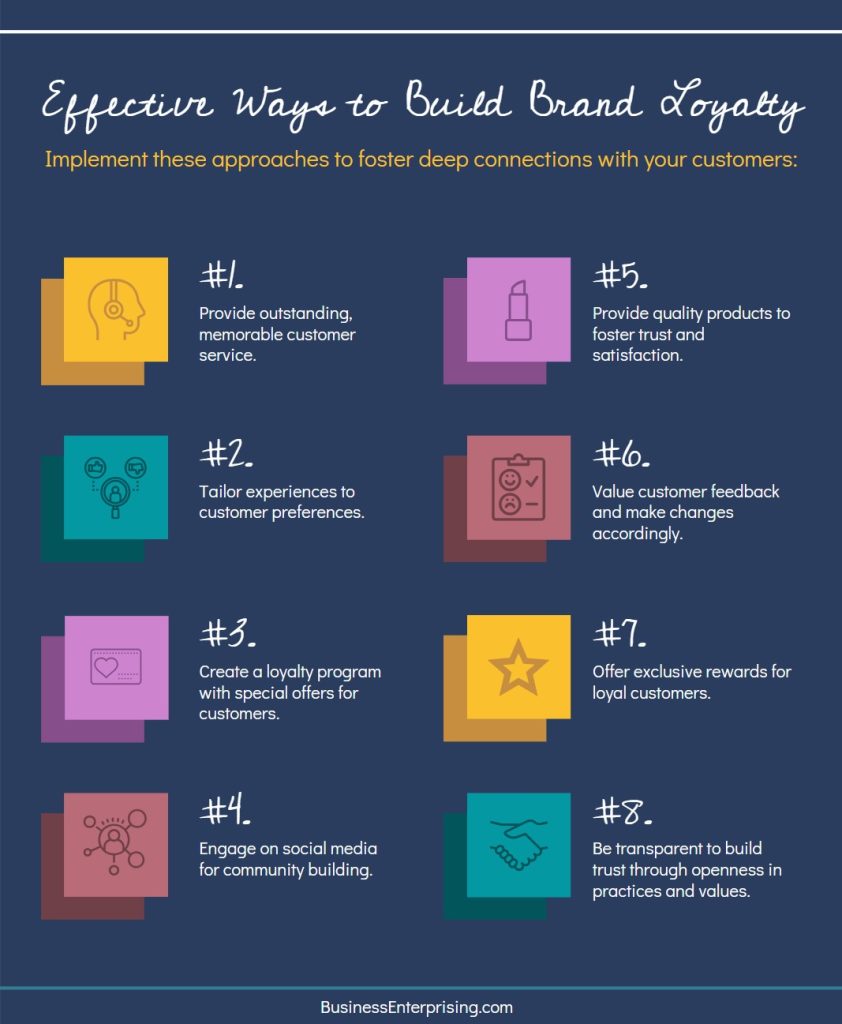
Additionally, consistent engagement and trust play a key role in fostering loyalty. When you focus on your customers’ needs, you encourage repeat business and long-term relationships. By adapting to changing behaviors and preferences, you also show that your brand values their input.
This article explores effective strategies for building retail brand loyalty. From loyalty programs to social media engagement, these approaches help create a loyal customer base. With the right tools and practices, you can strengthen your brand and foster lasting success in a competitive market.
Understanding the Value of Brand Loyalty in Retail
Brand loyalty plays a significant role in the success of retail businesses. Loyal customers are more likely to make repeat purchases. This consistency creates a stable revenue stream that helps your business grow and adapt over time. Additionally, retaining existing customers often costs less than acquiring new ones, making loyalty a cost-effective strategy.
Moreover, loyal customers can act as brand ambassadors for your business. They often recommend your products or services to friends and family. This organic word-of-mouth marketing further boosts your customer base and strengthens your brand’s reputation. Therefore, building retail brand loyalty is key to sustaining growth and staying competitive.
Additionally, brand loyalty contributes to higher customer lifetime value. Loyal customers are more likely to purchase premium products or try new offerings. This behavior increases your overall revenue while reducing the impact of seasonal fluctuations in sales. By focusing on loyalty, you create a foundation for long-term success and resilience in the retail market.
Understanding the value of loyalty helps you align your strategies with what matters most to your customers. A loyal customer base not only drives revenue but also provides stability and growth opportunities for your business.
Creating Memorable Customer Experiences
Creating memorable customer experiences is essential for building retail brand loyalty. Personalization plays a key role in customer satisfaction. When you tailor interactions to individual preferences, customers feel valued and understood. Additionally, personalized recommendations or offers make the shopping experience more engaging and relevant. These efforts not only increase sales but also encourage repeat visits.
Consistent and exceptional service is another cornerstone of memorable experiences. Customers appreciate reliability, so it’s important to meet their expectations every time they interact with your brand. Additionally, training your staff to provide friendly and knowledgeable assistance enhances the overall experience. When customers receive consistent care, they are more likely to trust and return to your business.
Moreover, exceptional service builds emotional connections that strengthen loyalty. Addressing issues promptly and exceeding expectations leaves a lasting impression on your customers. Happy customers are more likely to share positive feedback and recommend your business to others. By focusing on service quality, you create a strong foundation for long-term success.
By prioritizing personalization and consistent service, you foster trust and satisfaction among your customers. These strategies help you stand out in a competitive market while strengthening your efforts in building retail brand loyalty. A memorable experience keeps your customers coming back and makes them more likely to support your business over time.
Leveraging Loyalty Programs to Encourage Repeat Business
Loyalty programs are an effective way to encourage repeat business and build customer engagement. Offering rewards for purchases creates an incentive for customers to return. Programs can include points systems, tiered memberships, or exclusive discounts. These structures keep customers motivated to shop with you while strengthening their connection to your brand.
Additionally, successful loyalty programs often combine simplicity with meaningful rewards. For example, coffee chains offering free beverages after a set number of purchases make participation easy and rewarding. Retail giants have also found success by providing personalized offers through digital apps. These initiatives keep customers engaged by meeting their preferences and adding value to their shopping experience.
Moreover, loyalty programs play an essential role in building retail brand loyalty. By recognizing and rewarding your customers, you show them they are valued. This positive reinforcement builds trust and increases the likelihood of long-term relationships. When done effectively, loyalty programs not only drive repeat business but also help establish a strong and loyal customer base.
By implementing creative and thoughtful loyalty programs, you can stand out in a competitive market. These programs encourage your customers to choose your brand over competitors, ultimately contributing to consistent growth and success.
Using Data to Build Deeper Customer Relationships
Using data effectively helps you build deeper customer relationships and create meaningful interactions. By collecting and analyzing customer insights, you can better understand preferences, behaviors, and purchasing patterns. Additionally, tracking this data enables you to identify trends and anticipate customer needs. This proactive approach allows you to offer relevant solutions and enhance the overall experience.
Data also plays a key role in shaping targeted marketing and retention strategies. For example, segmentation based on purchase history lets you deliver personalized recommendations or promotions. Additionally, analyzing feedback and engagement metrics helps refine your campaigns for better results. When customers receive tailored communications, they feel valued and are more likely to remain loyal.
Building retail brand loyalty becomes easier when you use data to strengthen connections with your audience. Insights allow you to address specific needs and resolve issues more efficiently. This not only improves customer satisfaction but also fosters trust. By leveraging data thoughtfully, you can create experiences that resonate with your customers and encourage long-term loyalty.
Focusing on data-driven strategies positions your business to adapt and thrive in a competitive market. The ability to personalize and predict customer needs provides a clear advantage. Ultimately, these efforts help solidify your brand’s relationship with your audience and support sustained growth.
The Role of Social Media in Fostering Brand Connections
Social media plays a significant role in building retail brand loyalty by fostering connections with your audience. These platforms allow you to create a sense of community where customers feel involved and valued. By sharing engaging content, responding to feedback, and encouraging interaction, you make your brand approachable and relatable. Additionally, consistent communication helps you stay top of mind for your audience.
Engaging directly with customers on social media reinforces loyalty and trust. When you respond promptly to comments or questions, you show that their voices matter. Additionally, celebrating customer milestones or sharing user-generated content strengthens their emotional connection to your brand. These interactions turn casual followers into loyal advocates who are more likely to promote your business.
Building a community through social platforms also provides opportunities to highlight your values and story. By sharing updates, behind-the-scenes content, or hosting live events, you create a more personal connection. Customers who feel aligned with your brand are more likely to remain loyal and make repeat purchases. This connection contributes to long-term growth and a competitive edge.
Using social media effectively allows you to nurture relationships and keep customers engaged. By prioritizing meaningful interactions, you create an environment where loyalty thrives. Ultimately, these efforts support your goals of retaining customers and building retail brand loyalty in a competitive market.
Adapting to Changing Customer Expectations
Adapting to changing customer expectations is key to staying competitive and building retail brand loyalty. Consumer behaviors evolve as technology and trends shift. For example, many customers now expect seamless online shopping experiences and fast delivery. Additionally, an increasing focus on sustainability influences purchasing decisions. By staying informed about these trends, you can align your strategies with customer preferences.
Innovation is essential to meeting the evolving needs of your audience. Offering new features or updating your services keeps your business relevant and engaging. For example, adding personalized shopping recommendations or flexible return policies can set you apart from competitors. Additionally, leveraging technology such as AI or chatbots improves efficiency and enhances the customer experience.
When you anticipate customer needs, you create opportunities to exceed expectations and deepen loyalty. Regularly collecting feedback and analyzing data helps you identify areas for improvement. By addressing these insights, you show that you value your customers’ input. This proactive approach strengthens trust and fosters long-term connections.
Keeping up with customer expectations allows your business to thrive in a rapidly changing market. By prioritizing innovation and responsiveness, you create memorable experiences that resonate with your audience. These efforts not only attract new customers but also reinforce your commitment to building retail brand loyalty.
Conclusion
Building retail brand loyalty requires consistent effort and a focus on creating meaningful connections with your customers. By understanding their expectations and responding to their needs, you create a foundation for lasting relationships. Additionally, using tools like loyalty programs, social media, and personalized experiences keeps your audience engaged and satisfied.
However, customer loyalty is not static. It evolves with changes in behavior and market trends. Therefore, staying adaptable and proactive allows you to stay ahead and maintain trust. Regularly assessing your strategies and seeking feedback helps you identify new opportunities to serve your customers better.
In conclusion, prioritizing loyalty not only strengthens your brand but also supports long-term growth. When customers feel valued and connected to your business, they are more likely to return and advocate for your brand. By focusing on these strategies, you create a loyal customer base that sustains your success in an ever-changing market.



